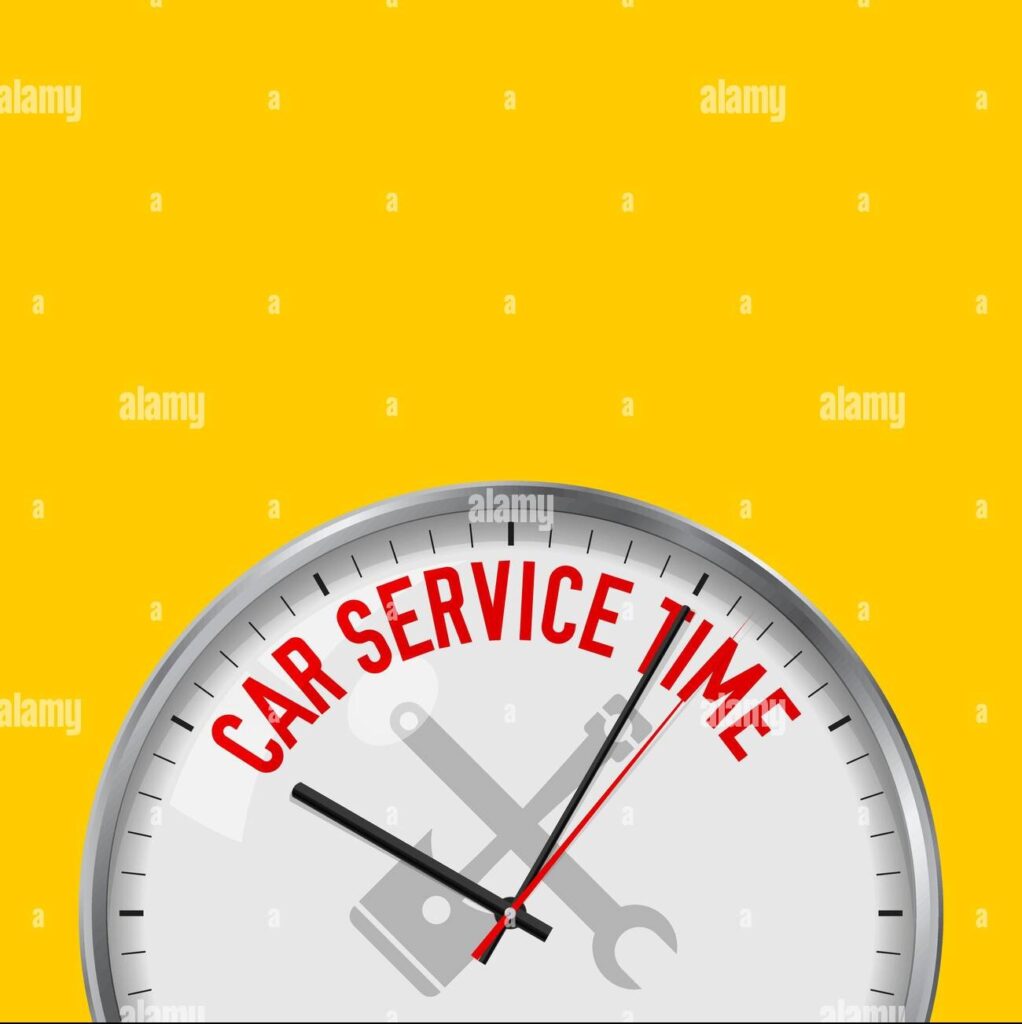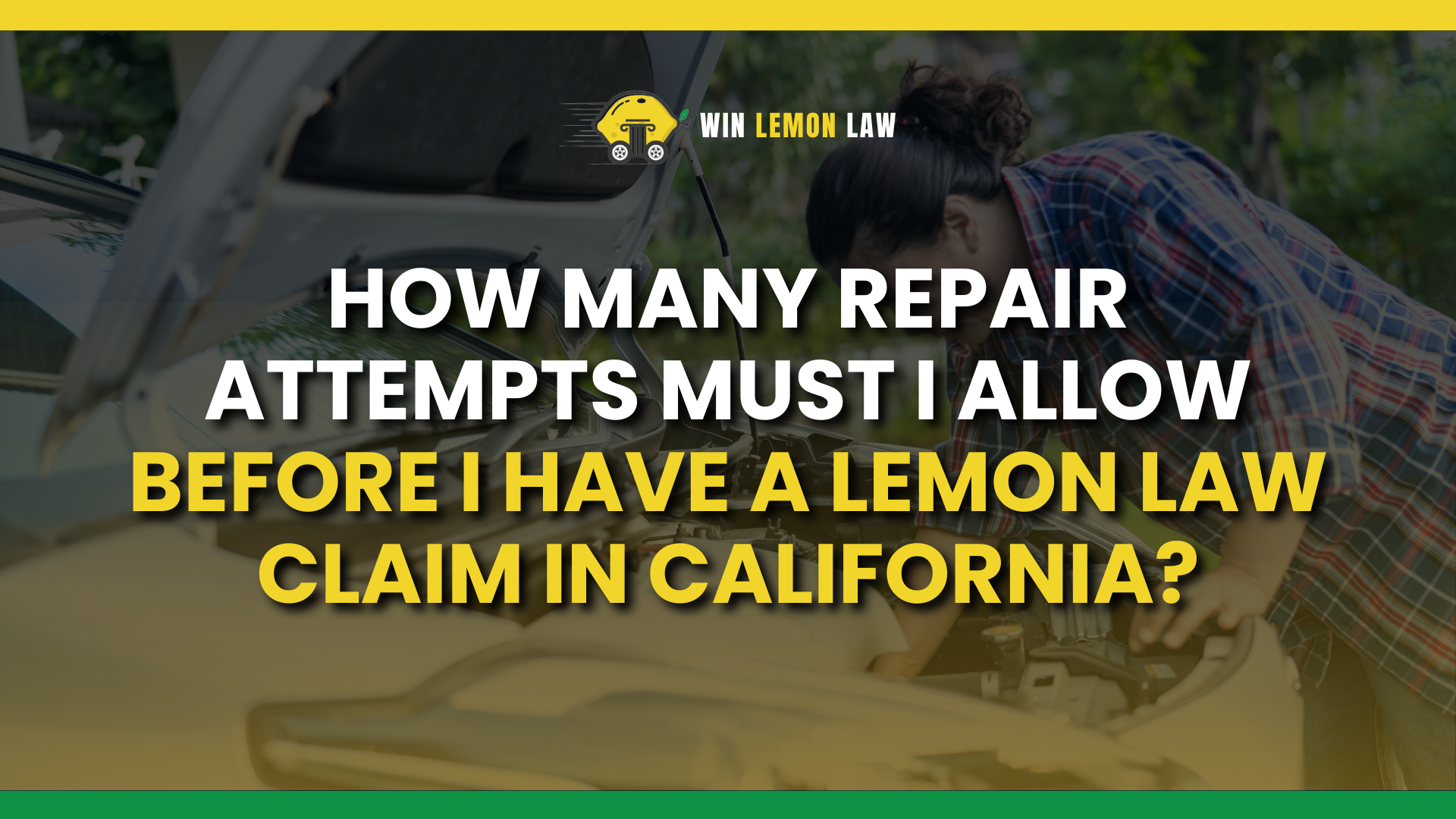Buying a new vehicle is often a thrilling experience, filled with excitement about the reliability, performance, and longevity of your purchase. In California, consumers are protected by the state’s Lemon Law, which ensures that vehicles that fail to meet the manufacturer’s warranty due to recurring defects are eligible for a refund, compensation, or a replacement.
However, when your car starts spending more time in the repair shop than on the road, it can be frustrating, especially if the issues remain unresolved. The California Lemon Law is designed to protect consumers in these situations, offering recourse when the vehicle is deemed a “lemon.” But many vehicle owners are unsure about how many repair attempts must be made before they have the right to file a Lemon Law claim.
If you’ve been dealing with ongoing vehicle issues, you may be wondering: When is enough, enough? How many repair attempts should be made before you have grounds to file a claim? Understanding the answer to this question is crucial for protecting your rights and ensuring that your vehicle is properly repaired or replaced. In this blog post, we’ll dive deep into the key aspects of California’s Lemon Law, focusing specifically on the number of repair attempts needed before you can take legal action. Let’s explore how the law works, what it requires, and how to proceed if you believe you have a lemon.
For advice tailored to your unique situation, don’t hesitate to reach out to Win Lemon Law. Our skilled attorneys are here to help guide you through the process and advocate for your rights.
Understanding California’s Lemon Law

California’s Lemon Law, officially known as the Song-Beverly Consumer Warranty Act, is designed to protect consumers who purchase or lease defective vehicles. It holds manufacturers accountable for delivering a reliable product and ensures that they repair or replace vehicles that do not meet the standards set out in the warranty.
The law applies to both new and used vehicles that are still under the manufacturer’s original warranty. This coverage extends beyond just cars; it includes trucks, SUVs, motorcycles, and even some types of recreational vehicles. Essentially, if the vehicle you purchased or leased has recurring defects that impair its safety, value, or usability, the law may provide you with a remedy.
Under the Song-Beverly Act, vehicles that are deemed “lemons” must meet specific criteria to qualify for a Lemon Law claim. One of the most important factors in determining whether a vehicle is a lemon is the number of failed repair attempts. Let’s take a closer look at how this is assessed under California law.
Repair Attempts and When Your Vehicle May Qualify as a Lemon
When it comes to determining whether your vehicle qualifies as a lemon, California law outlines clear guidelines regarding repair attempts. The law recognizes that not every defect warrants a claim, and it seeks to balance the interests of both consumers and manufacturers. While the specifics can vary depending on the circumstances, there are general rules that apply in most cases.
Serious Safety Defects
If your vehicle has a defect that poses a serious safety risk, such as problems with the brakes, steering, airbags, or other critical safety systems, California law is much more strict. Safety-related defects are given priority because they can potentially cause severe injury or death. As a result, if your vehicle has a serious safety defect, the manufacturer or dealer is generally required to make at least two unsuccessful repair attempts before the vehicle qualifies as a lemon.
For instance, if you bring your car in for repair due to faulty brakes and the issue is not resolved after two repair attempts, the vehicle may be deemed a lemon under California law. If the defect compromises your safety, it is considered an urgent matter, and the manufacturer or dealer should be given the opportunity to address it promptly.
Non-Safety Defects
Not all vehicle defects are related to safety, but some still significantly impact the vehicle’s functionality, use, or value. These types of defects may include engine problems, electrical system failures, transmission issues, and other mechanical malfunctions that affect the car’s performance. For non-safety defects, the manufacturer or dealer is typically allowed up to four repair attempts to resolve the issue.
For example, if your vehicle’s engine continues to misfire despite being brought in for repairs on multiple occasions, and the issue remains unresolved after four attempts, you may have grounds for a Lemon Law claim. While these defects may not pose an immediate risk to your safety, they still affect the car’s overall reliability and function, and as a consumer, you should not be expected to live with them indefinitely.

Extended Time in the Repair Shop
In addition to the number of repair attempts, California Lemon Law also considers the amount of time your vehicle spends in the repair shop. If your car is in the shop for a total of 30 or more days (cumulative) during the first 18 months or 18,000 miles of ownership, you may be presumed to have a valid claim, regardless of the nature of the defect.
The 30-day period does not need to be consecutive, and this provision is especially helpful in cases where your vehicle is repeatedly in the shop for repairs over an extended period. If your car is effectively out of service for a significant portion of time, it may not be reasonable to expect you to continue enduring these repeated repairs. If your vehicle has been in the shop for this amount of time, you likely have a valid Lemon Law claim.
What Counts as “Reasonable” Repair Attempts?
One of the key aspects of California’s Lemon Law is the concept of “reasonable repair attempts.” This standard ensures that the manufacturer or dealer is given a fair opportunity to resolve the issue but does not require endless attempts if the defect is unfixable. What is considered “reasonable” varies depending on the specific defect and circumstances.
For serious safety defects, a single repair attempt may be considered reasonable if the issue poses an immediate danger to your safety. In contrast, for less urgent issues like cosmetic defects or minor performance problems, a longer repair period may be deemed necessary to allow for proper diagnosis and resolution.
The determination of whether the number of repair attempts is reasonable often depends on the nature of the defect, how long it takes to fix, and the amount of time the car has been out of service. If you’re unsure about whether your situation qualifies, consulting with a Lemon Law attorney can provide clarity.
Keep Detailed Records of All Repair Attempts
To support your Lemon Law claim, it’s essential to keep thorough documentation of all repair attempts made by the manufacturer or dealer. This documentation will serve as critical evidence that the manufacturer or dealer had a reasonable opportunity to fix the issue but failed to do so.
Here are some important records to keep:

- Dates of each visit to the dealership or repair shop: Track every time your car is brought in for repairs, including follow-up visits for recurring issues.
- Specific problems reported: Write down the exact nature of the defect each time you report it, as well as any symptoms you notice.
- Work orders, receipts, and invoices: Keep all paperwork that documents the work performed on your vehicle, including parts replaced and labor completed.
- Communication with the manufacturer or dealer: Retain copies of emails, letters, or text messages that detail conversations about the defects and the steps taken to resolve them.
Having these records in order will provide a strong foundation for your claim and make it easier to prove that the manufacturer or dealer failed to fix the problem despite multiple attempts.
What Should You Do If You Have a Lemon?
If you suspect that your vehicle qualifies as a lemon, the next step is to take action. Under California’s Lemon Law, you may be entitled to the following remedies:
- A full refund: This includes the purchase price of your vehicle, taxes, registration fees, and any incidental costs such as towing or rental cars.
- A replacement vehicle: You may be entitled to a vehicle of similar value if you prefer a replacement rather than a refund.
- Reimbursement for repair costs: If you’ve already spent money on repairs, you could be reimbursed for these costs.
Before proceeding with a Lemon Law claim, it’s highly recommended that you consult with an experienced attorney who specializes in Lemon Law cases. A skilled attorney will be able to assess the specifics of your case, advise you on the best course of action, and ensure that you receive the compensation you deserve.
Closing
At Win Lemon Law, we understand the frustration that comes with dealing with a defective vehicle. Our team of dedicated attorneys is here to help you navigate the complexities of California’s Lemon Law and fight for the resolution you deserve. If you think your vehicle might be a lemon, don’t hesitate to contact us for a free consultation.
Our experienced lawyers will review your case, provide personalized guidance, and ensure that your rights are protected throughout the process. Whether you’re entitled to a refund, a replacement, or reimbursement for repair costs, we will fight to get you the compensation you deserve.
Call Win Lemon Law today to speak with an attorney who can help you understand your rights and guide you through the process. Our consultations are free, and we’re here to help you get back on the road in a reliable vehicle.

